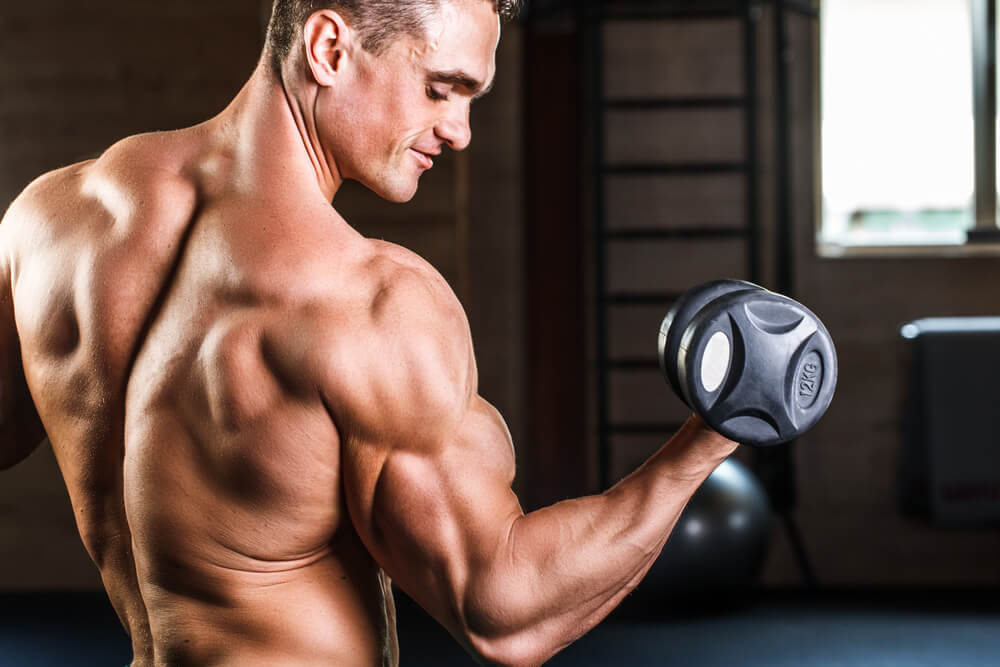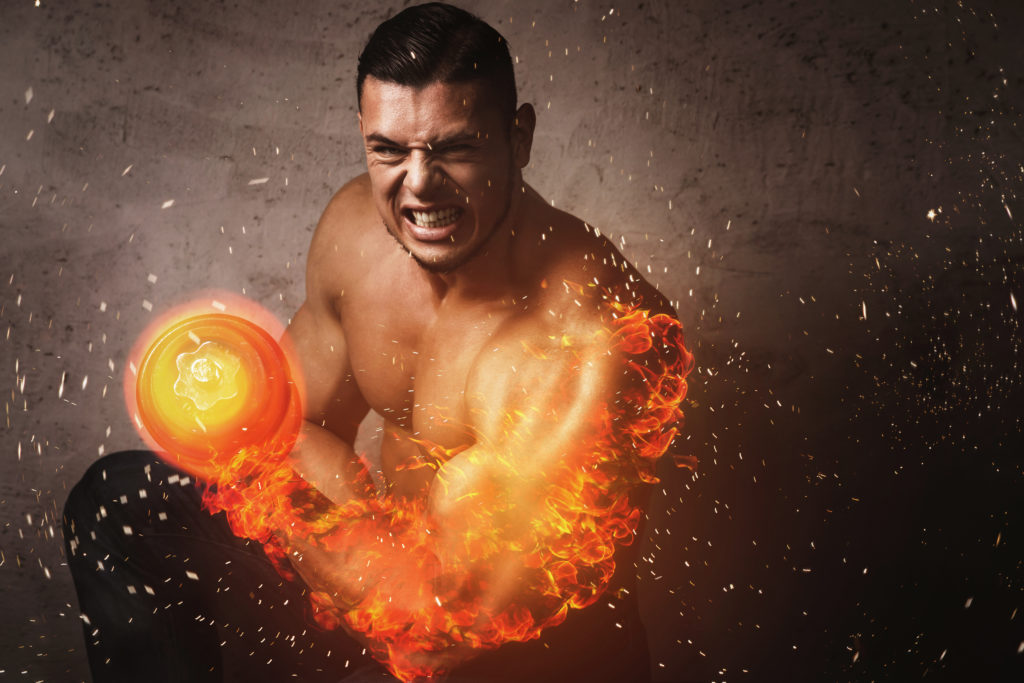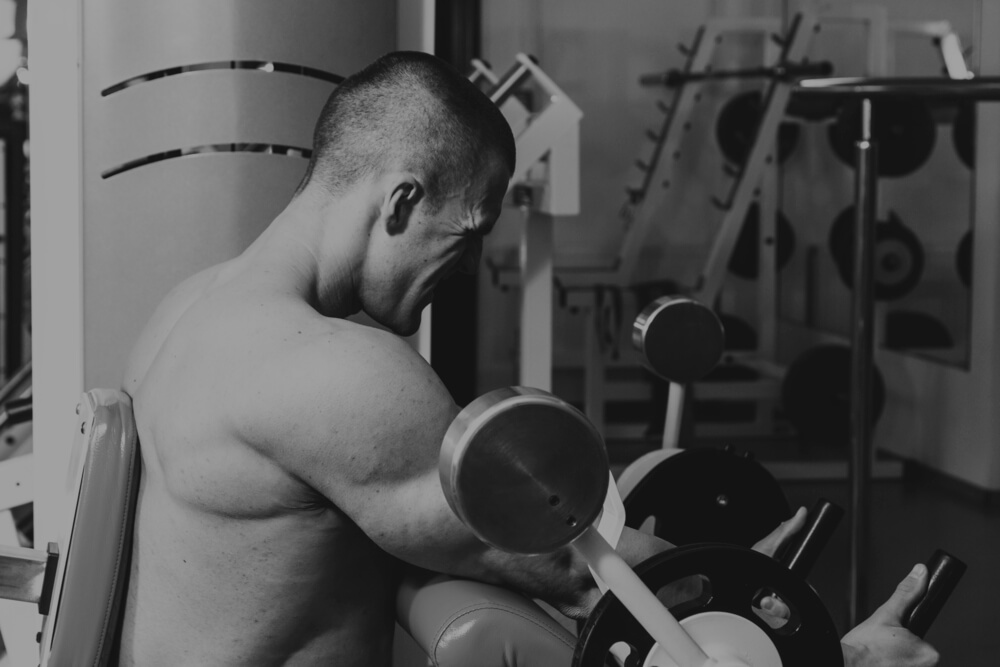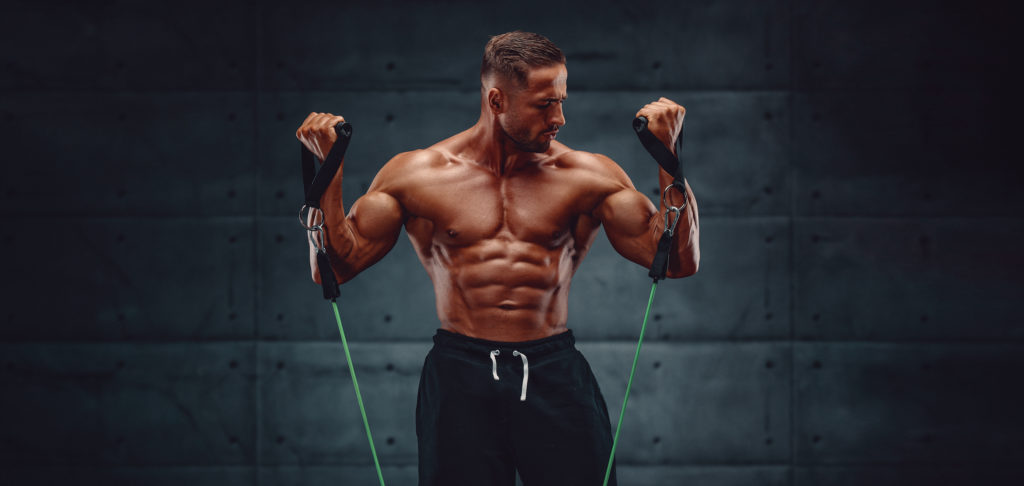When it comes to building a strong and impressive physique, well-developed arms play a significant role. Whether you’re aiming for visually striking 14-inch arms or simply looking to enhance your overall athleticism, focusing on bicep and tricep training is essential. The arms are often the most visible indicators of strength and fitness, and mastering effective workouts can lead to remarkable arms of steel.
In this blog post, we’ll explore the anatomy of the arms, the importance of biceps and triceps training, workout strategies, and specific exercises that can help you achieve the impressive muscle definition you’re looking for, including iconic moves like the lat pulldown bar and techniques that allow you to poke a muscle and ignite its growth.

Understanding Arm Anatomy
Before diving into the workouts, it’s crucial to understand the muscles you’ll be targeting:
-
Biceps Brachii
The biceps brachii, commonly referred to simply as the “biceps,” consists of two heads:
- Long Head: This head runs along the outer portion of the arm and is responsible for the “peak” of the bicep.
- Short Head: This head runs along the inner portion of the arm and contributes to the overall size and fullness of the bicep.
The primary function of the biceps is elbow flexion—lifting the forearm toward the shoulder.
-
Triceps Brachii
The triceps brachii, as the name suggests, has three heads:
- Long Head: This head originates from the shoulder blade, adding mass and strength to the back of the arm.
- Lateral Head: Positioned on the outer part of the arm, this head is more visible and contributes to the size.
- Medial Head: Located underneath the other two heads, this head provides overall fullness and support.
The triceps are primarily responsible for extending the elbow, allowing for pushing movements.

Importance of Training Biceps and Triceps
Training your biceps and triceps is essential for several reasons:
-
Aesthetic Appeal
Well-defined arms are not only a sign of physical strength but also enhance your overall physique. For many, achieving 14-inch arms or larger is a significant goal that contributes to a V-tapered appearance.
-
Functional Performance
Strong arms play crucial roles in daily activities such as lifting, pushing, and pulling. Building strength in both muscle groups allows for improved performance across various physical tasks and sports.
-
Muscle Balance
Neglecting one muscle group can lead to imbalances that may result in injuries. A balanced workout that targets both the biceps and triceps promotes overall arm health.
-
Compound Lifts
Strong triceps can enhance your performance in compound lifts such as bench presses or overhead presses. Training your arms directly can improve your lifting capability, leading to overall strength gains.
Effective Arm Workouts
To develop strong and impressive arms, we’ll look at workouts that emphasize both biceps and triceps. Here are some of the best exercises to incorporate into your routine.
-
Bicep Curls
Muscle Targeted: Biceps
How to Perform:
- Stand upright with a dumbbell in each hand, arms at your sides, and palms facing forward.
- Keep your elbows close to your torso and curl the weights while focusing on poking a muscle by squeezing the biceps at the top of the movement.
- Lower the weights back down in a controlled manner and repeat for 3 sets of 10-12 reps.
Variations:
- Hammer Curls: Rotate your wrists so your palms face each other.
- Concentration Curls: Perform one arm at a time, resting your elbow against your inner thigh to focus on peak contraction.
-
Tricep Dips
Muscle Targeted: Triceps
How to Perform:
- Use parallel bars or a sturdy surface like a bench.
- Support your body weight with your arms extended, and legs straight out in front of you.
- Lower your body until your elbows are at about a 90-degree angle, then push back up to the starting position.
- Perform 3 sets of 8-10 reps, making sure to keep your back close to the surface.
Variations:
- Bench Dips: Keep your feet on the ground and your back against the bench for added stability.
- Weighted Dips: Use a dip belt or hold a weight plate for added resistance.
-
Skull Crushers
Muscle Targeted: Triceps
How to Perform:
- Lie on a flat bench with a barbell or EZ curl bar.
- Start with the bar straight above your chest, then lower it toward your forehead by bending your elbows.
Use your triceps to extend the bar back to the starting position, ensuring your elbows remain stationary throughout the movement. Perform 3 sets of 8-12 reps, focusing on controlled movements to maximize tricep engagement.
Variations:
- Dumbbell Skull Crushers: Use two dumbbells instead of a barbell. This can help alleviate any discomfort in the wrists while allowing for a greater range of motion.
- Incline Skull Crushers: Perform the exercise on an incline bench to target the upper part of the triceps more intensely.
-
Lat Pulldown
Muscle Targeted: The lat pulldown primarily targets the lats, but it also engages the biceps and forearms.
How to Perform:
- Sit at the lat pulldown machine and grasp the bar with a wide grip, palms facing away from you.
- Pull the bar down towards your chest while leaning slightly back, driving your elbows down and back.
- Squeeze your shoulder blades together as your elbows come down.
- Slowly release the bar back up in a controlled manner, allowing for a full range of motion.
- Perform 3 sets of 10-12 reps to ensure you feel the muscle “poke” during each contraction.
Variations:
- Wide-Grip Pulldowns: Use a wider grip to emphasize lat activation.
- Close-Grip Pulldowns: A closer grip shifts focus towards the biceps, providing a great finisher after back workouts.
-
Close-Grip Bench Press
Muscle Targeted: Triceps, but also engages the chest and shoulders.
How to Perform:
- Lie on a flat bench and grasp a barbell with a narrow grip, hands positioned just inside shoulder-width.
- Lower the barbell to your chest, keeping your elbows close to your body.
- Press the bar back up to the starting position, squeezing the triceps at the top of the motion.
- Aim for 3 sets of 8-10 reps, ensuring proper form to maximize tricep activation.
Variations:
- Dumbbell Close-Grip Press: Use dumbbells to allow a more natural wrist position.
- Smith Machine Close-Grip Press: This variation offers stability and is user-friendly for newer lifters.
-
Barbell Curl
Muscle Targeted: Biceps
How to Perform:
- Stand upright holding a barbell with both hands at shoulder-width apart, palms facing upward.
- Keeping your elbows close to your sides, curl the bar towards your shoulders, squeezing the biceps at the top of the movement.
- Lower the barbell slowly back to the starting position to maintain tension in the biceps.
- Perform 3 sets of 8-12 reps.
Variations:
- EZ Bar Curl: Use an EZ curl bar to alleviate strain on the wrists.
- Reverse Grip Barbell Curl: This variation shifts focus from the biceps to the forearm muscles.
Structuring Your Arm Workout Routine
An effective arm workout routine can be structured to ensure comprehensive engagement of both the bicep and tricep muscles, targeting each effectively for growth and strength development. Here is a sample arm workout you can incorporate:

Sample Arm Workout Routine
Warm-Up: 10 Minutes
- Light cardio (e.g., jumping jacks or brisk walking)
- Dynamic arm circles and stretches
Arm Workout:
- Barbell Curls: 3 sets of 10-12 reps
- Skull Crushers: 3 sets of 10-12 reps
- Lat Pulldown: 3 sets of 10-12 reps
- Tricep Dips: 3 sets of 8-10 reps
- Hammer Curls: 3 sets of 10-12 reps
- Close-Grip Bench Press: 3 sets of 8-10 reps
- Dumbbell Tricep Kickbacks: 3 sets of 10-12 reps to ensure those 14-inch arms are developed well.
Cool Down: 5-10 Minutes
- Static stretches focusing on the biceps and triceps
- Light foam rolling to release any tension
The Role of Nutrition in Arm Training
While effective workouts are crucial for building impressive 14-inch arms, nutrition plays an equally vital role in muscle growth and recovery. Here’s how you can optimize your nutrition:
-
Adequate Protein Intake
- Why It’s Important: Protein is fundamental for muscle repair and growth. Aim for 1.2 to 2.2 grams of protein per kilogram of body weight, depending on your training intensity.
- Sources: Incorporate lean meats, fish, dairy, eggs, legumes, and plant-based protein sources into your diet.
- Why It’s Important: Carbohydrates are your body’s main source of energy, especially during high-intensity workouts. Eating sufficient carbohydrates ensures that you have the energy needed to power through your arm workouts effectively.
- Sources: Focus on complex carbohydrates such as whole grains (brown rice, quinoa, oats), fruits, and vegetables. Each meal should have a healthy portion of carbs to replenish glycogen stores depleted during exercise.
-
Healthy Fats
- Why It’s Important: Fats are vital for hormone regulation, including the hormones responsible for muscle growth, such as testosterone. Healthy fats also provide a concentrated source of energy.
- Sources: Include sources like avocados, nuts, seeds, olive oil, and fatty fish (like salmon) in your diet. Aim to have healthy fats in moderation, contributing about 20-35% of your total daily calories.
-
Timing of Nutrient Intake
- Importance of Timing: Consuming the right nutrients at the right times can enhance your workout performance and recovery.
- Pre-Workout Nutrition: Have a balanced meal containing protein and carbohydrates about 1-2 hours before workouts. If you’re short on time, a protein shake with a banana works great for a quick pre-workout.
- Post-Workout Nutrition: Aim to consume a meal or snack rich in protein and carbohydrates within 30-60 minutes after your workout. This timing can maximize muscle repair and recovery. Protein shakes, lean meats, and rice or fruits are excellent options.
-
Hydration
- Importance of Hydration: Staying hydrated is critical for optimal performance and recovery. Water facilitates nutrient transport, regulates body temperature, and helps in muscle contraction.
- Recommendations: Drink water throughout the day, aiming for about 3 liters (or roughly 13 cups) daily for men, and 2.2 liters (about 9 cups) for women. Increase your intake when exercising, especially during intense workouts targeting the arms.
The Importance of Rest and Recovery
Just as important as training is the time you allow your muscles to recover and adapt. Effective rest and recovery strategies enhance muscle growth and performance. Here are practices you should integrate:
-
Get Enough Sleep
- Why Sleep Matters: Quality sleep is essential for recovery and muscle growth. During sleep, your body produces growth hormone and repairs tissues damaged during workouts.
- Recommendations: Aim for 7-9 hours of sleep per night to maximize recovery. Create a consistent sleep schedule and a relaxing bedtime routine to improve sleep quality.
-
Implement Active Recovery
- What is Active Recovery?: Active recovery involves low-intensity exercise performed after a strenuous workout to promote blood circulation and accelerate the recovery process.
- Examples: Go for a light walk, do some gentle yoga, or engage in cycling, which helps keep the muscles loose without over-exertion.
-
Listen to Your Body
- Importance of Body Awareness: Pay attention to how your body feels post-workout. If you’re experiencing fatigue, soreness, or even pain that’s unusual, consider incorporating additional rest days or lighter workouts.
- Indicators: Signs like irritability, insomnia, and decreased performance may be signals that you need more recovery time or to reassess your training intensity.

Utilizing Accessories for Arm Training
Certain accessory tools can enhance the effectiveness of your arm workouts, leading to better results:
-
Resistance Bands
- Benefits: Bands add variable resistance, making exercises like curls or tricep extensions more challenging. They’re especially useful for warming up or as part of a finishers circuit.
- Usage: Incorporate bands in your arm training routine to ensure muscles are adequately engaged, especially during exercises like lat pulldown bar movements.
-
Weighted Vests
- Benefits: Using a weighted vest during bodyweight exercises (like push-ups) can increase the challenge, leading to greater strength and size gains.
- Usage: Add a vest for exercises focusing on the arms and chest to promote enhanced muscle recruitment and growth.
-
Isolation Machines
- Examples: Machines like the cable machine or different pulley systems can be excellent for targeting specific muscle groups without risking injury.
- Usage: Utilize machines for exercises like cable tricep pushdowns or bicep cable curls to precisely target and isolate your arms efficiently.

Conclusion
Building impressive 14-inch arms requires a multifaceted approach that combines targeted strength training, effective nutrition, adequate rest, and strategic recovery techniques. By focusing on exercises that effectively engage your biceps and triceps—like skull crushers, barbell curls, and the lat pulldown bar—you can develop strong and aesthetic arms that enhance your overall physique.
Don’t underestimate the power of nutrition and proper recovery; without these components, even the most rigorous workout
-Terry Asher
Terry Asher
Latest posts by Terry Asher (see all)
- Better Family – Product Review Liquid Daily 2 oz - Dec 16, 2024
- Post-Workout Recovery: The Key to Optimal Performance - Nov 25, 2024
- Pre-Workout Supplements – Everything You Need To Know - Nov 18, 2024









[…] Source link […]
[…] Source link […]